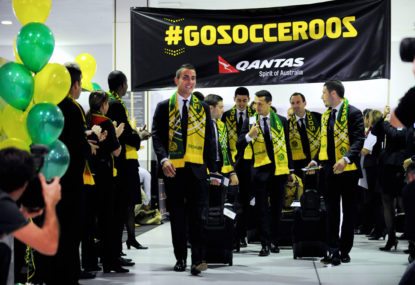Tears and songs as Jurgen Klopp says an emotional goodbye to Anfield for last time as manager
The Reds defeated Wolves 2-nil and gave the manager a fitting send-off after nine Premier League seasons at the club - and he even…

As a frequent contributor to the Sydney Morning Herald, I really shouldn’t bite the hand that feeds me. However, there’s backsliding in the sports department that really can’t go unchallenged.
By the time the World Cup is over, I expect to have been driven mad by that newspaper’s sports pages’ anachronistic return to the use of team names as a singular.
Australia is ‘it’, Spain is ‘it’ even the Netherlands are, sorry, is ‘it’.
What is this, 1966? Err, no, because England won’t even get out of their group.
Watching the sports sub-editors of the SMH and other linguistically under-evolved newspapers cling to this archaic form, tying themselves to the mast of style while torrents of accepted usage rage round them, is verging on the comical.
In a guide to the game against Chile in today’s Herald, we hear that “Australia should be no match for Chile. It is in a rebuilding phase and its opponent is at its peak …”
At least they are consistent but substitute they for it and their for its and hear how easy it is.
However, the subs stick to their muskets throughout the article. It’s all going well until, oh, no, they feel compelled to use the nickname of the Australian football team. Like a lunging penalty area tackle on a hook-footed Italian in the last minute of a drawn match, no good can come of this.
“That may be just what the Socceroos need,” says the article, and you can sense the whole grammatical confection quivering under its own weight. “There is no pressure on them, all they have to do is perform.”
Need? And as for ‘them’ and ‘they’, what happened to ‘it’? Oh, I see, we are talking contemporary English now. How disappointing. I was looking forward to reading about Mr Mark Bresciano’s fitness and Mr Tim Cahill’s confidence.
Is this regression to ancient forms the result of New Zealand subbery? Have we been dragged back to the 20th Century by ‘correct’ usage that no one uses?
Football people never talk about their teams as “it”. Fans don’t, commentators don’t and even sports journos having a beer with their mates don’t. Your team are they, them, we and us.
The grammatical rule for collective nouns, such as it is, is to use your discretion. But, like choosing a back-pass when a through-ball is on, playing safe with language often means getting it wrong.